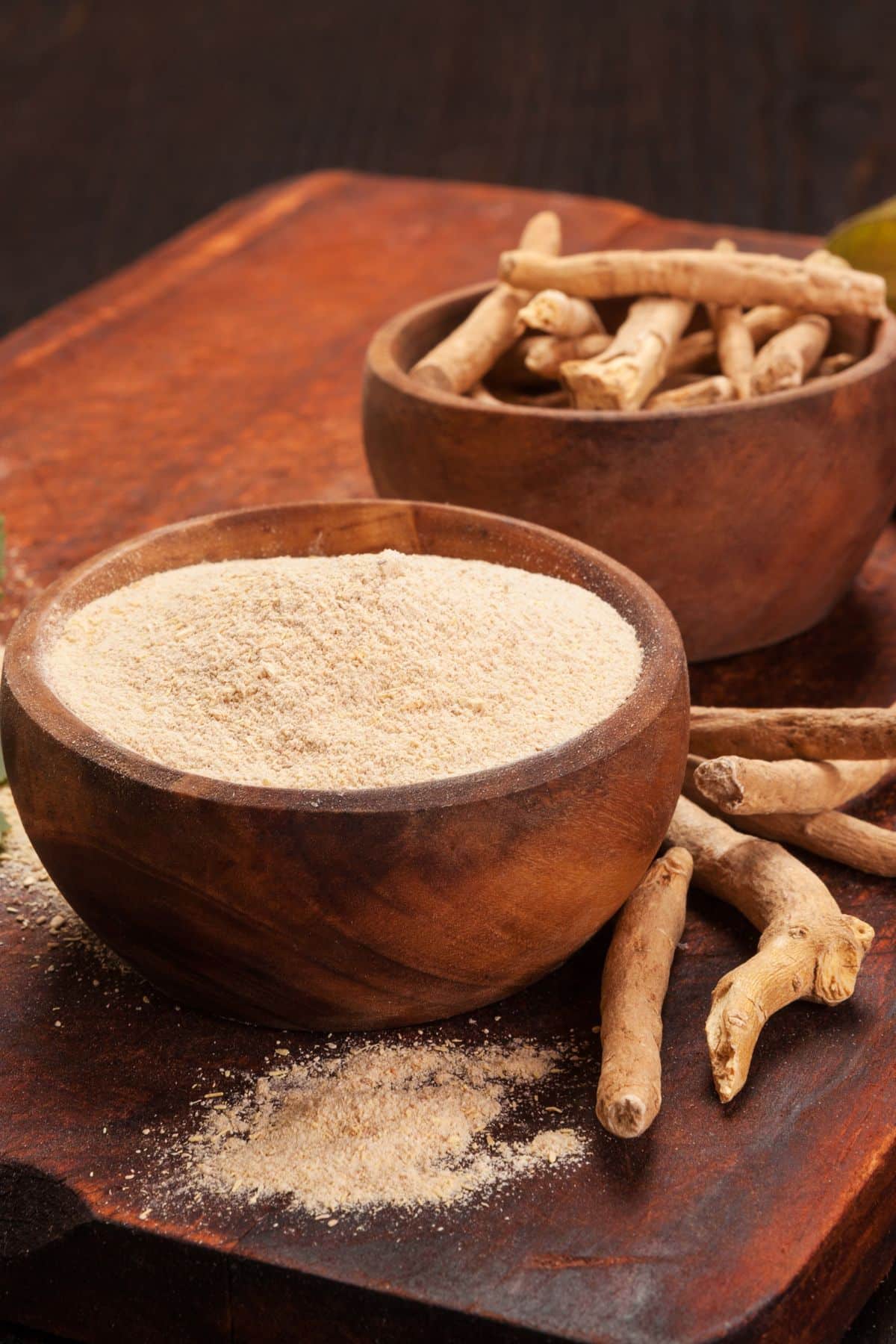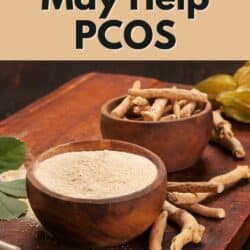Ashwagandha & PCOS (6 Benefits for Managing Symptoms)
In this article, we’ll review several ways that ashwagandha may help with PCOS, and why you may wish to consider taking ashwagandha to help manage symptoms. Learn the potential benefits of this ayurvedic herb for polycystic ovarian syndrome.

Ashwagandha (Withania somnifera) is an herb widely used in traditional Ayurvedic medicine – an alternative form of medicine based on Indian traditions of natural healing.
Also known as “Indian ginseng” and “winter cherry”, it is taken in the form of an extract or powder. These are prepared from the root of the ashwagandha plant, which is native to India and Southeast Asia.
It is believed to possess various health benefits, including potential effects on polycystic ovary syndrome (PCOS), a common hormonal disorder for women’s health.
These healing properties are due to the naturally occurring steroids known as withanolides that it contains. Ashwagandha may also have adaptogenic properties for the endocrine system. This means it can have beneficial effects and potential health benefits.
While research on the topic is limited and further studies are needed to establish conclusive evidence, there are some indications that ashwagandha may offer certain benefits for individuals with PCOS.
And, of course, it’s always important to discuss making any changes to your supplement routine with your healthcare provider.
6 Potential Benefits for Ashwagandha and PCOS
1. Hormonal Balance
Experts have found that many women with PCOS have hormonal imbalances.
These include:
- High levels of prolactin (the hormone that triggers the production of breast milk in pregnancy),
- Raised testosterone levels,
- Too much luteinizing hormone (a hormone that supports ovulation but can have adverse effects on the ovaries when levels are elevated),
- Reduced levels of sex hormone-binding globulin, a protein that reduces the effects of testosterone by binding to it in the blood.
These imbalances can be problematic for women of reproductive age, causing issues like hair loss, acne, irregular periods, infertility, and hirsutism (the growth of facial hair, unwanted hair growth, or excess body hair).
It’s unclear just what causes these imbalances and whether the problem originates in the ovaries, in the glands responsible for producing the hormones, or even in the part of the brain that regulates their production.
But, the good news is that there are several studies demonstrating how the use of ashwagandha can be useful in getting hormonal levels back to normal.
Researchers in 2018 found that the herb can normalize levels of thyroid-stimulating hormone (TSH) in people with hypothyroidism – a condition often found co-existing with PCOS.
When thyroid levels are low, the level of sex hormone-binding globulin drops, and testosterone levels rise.
Further studies on women during perimenopause again found that ashwagandha helps balance hormones, with the participants’ estrogen levels rising significantly after treatment.
Another key to keeping your hormones well-balanced is getting enough sleep.
Ashwagandha can be useful in that respect, too, and there is evidence that taking it on a daily basis not only improves sleep quality but also boosts mental alertness on waking!
2. Insulin Sensitivity
Insulin resistance – where the body is able to make insulin but can’t use it effectively – is a common feature of PCOS. See my tips for a PCOS anti-inflammatory diet to help with lifestyle changes.
When your body is functioning normally, your insulin levels rise after you eat. These then stimulate the muscles and liver to use the sugar from your blood and turn it into energy.
Your blood sugar levels then fall, and your insulin levels drop, too.
But if you have insulin resistance, the cells in your body don’t respond properly to the insulin that your pancreas produces. As a result, it produces more and more to try to overcome the resistance. This pushes your insulin levels too high.
When the pancreas can no longer make the increased amount of insulin you need to keep your blood sugar under control, type 2 diabetes can develop.
High insulin also has a detrimental effect on ovulation – potentially affecting your fertility – and can cause your body to make too much testosterone.
Ashwagandha has been investigated for its potential antidiabetic effects and has shown promising results in improving insulin sensitivity (another term for insulin resistance).
A study on rats found that it can decrease elevated blood sugar and insulin levels, with experts concluding that it may be a suitable supplement for the prevention of diabetic complications.
And other research has shown that it can help balance blood sugar levels in people both with and without diagnosed diabetes.
Whilst this is good news, it’s also important to remember that a healthy lifestyle plays a big part in reducing insulin resistance.
A nutritious diet and regular exercise can help keep your weight under control, which is known to improve the symptoms of insulin resistance no matter the cause.

3. Stress Reduction
Chronic stress can exacerbate PCOS symptoms and hormonal imbalances.
That’s because it triggers our adrenal glands to create cortisol, often referred to as the stress hormone or the “fight or flight” hormone.
It is cortisol that enables us to react quickly to hazardous situations, or to things that overly worry us (looming deadlines at work, for example, or moving home).
But when your cortisol levels are too high, a condition of chronic stress develops.
This can lead to a whole host of symptoms – but when it comes to PCOS, the main problem is its impact on androgens (the male hormones in your body) and the imbalance it creates.
Ashwagandha is considered an adaptogen, meaning it may help the body adapt to stress and reduce its negative impact.
There are multiple studies proving its effectiveness!
The authors of this study found that it can block stress pathways, reduce anxiety and help resolve sleep disorders.
This 6-week placebo-control study yielded similar results, as did this research involving 60 participants, almost 70% of whom reported a reduction in their anxiety levels and insomnia after taking ashwagandha.
A study published in the Journal of Evidence-Based Complementary and Alternative Medicine, meanwhile, confirmed that ashwagandha might help reduce cortisol levels.
4. Anti-Inflammatory Properties
Many cases of PCOS involve a state of chronic low-grade inflammation in the body.
Indeed, experts have established through blood tests that people with PCOS tend to have higher levels of certain inflammatory markers than people without the condition.
But there is evidence that ashwagandha can help, thanks to the natural bioactive compound Withaferin A (WA) that it contains.
WA is believed to help reduce levels of inflammatory proteins like interleukin-10 (IL-10), a theory borne out by a 2021 study involving people with COVID.
There has also been research showing that ashwagandha can be helpful in reducing inflammation in people with arthritis.
This means that – by addressing inflammation – the herb may help alleviate certain symptoms associated with PCOS.
5. Fertility and Ovulation
PCOS is often associated with irregular menstrual cycles and difficulties with ovulation.
Although the research is in its early stages, there are some studies that suggest ashwagandha may be useful for treating infertility in both women and men.
This is likely because it helps balance the hormones and reduces oxidative stress, promoting egg production and increasing the likelihood of conception.
Still, more research is needed in this area to establish its effectiveness.

6. Weight Management
Many women with PCOS struggle with weight gain and have a hard time losing weight due to insulin resistance.
Yet many of the benefits of ashwagandha I’ve already discussed can go a long way towards helping manage your weight too!
For example, stress in women with PCOS has been shown to alter body composition.
That’s because cortisol can cause abdominal fat to accumulate while simultaneously contributing to muscle loss.
Because ashwagandha can help lower cortisol, these effects are reduced.
As discussed earlier, ashwagandha can also help combat insulin resistance, another condition that can lead to weight gain.
Ashwagandha and PCOS FAQs
Ashwagandha is generally considered safe for most people when used in moderation, with some exceptions. It is not recommended when pregnant or breastfeeding, or if you have an autoimmune condition (like rheumatoid arthritis, lupus, or type 1 diabetes), thyroid problems, issues with your liver, or are about to have surgery. It may also be unsuitable if you are taking certain medications.
There hasn’t been much research into its long-term safety, however, so most doctors will only suggest taking it for up to 3 months. Remember – everyone’s body reacts differently to supplements, and it’s always a good idea to consult a healthcare provider before starting a new supplement regimen, particularly if you have a medical condition like PCOS.
Ashwagandha can be taken in various forms like capsules, powder, or as a tea. Although the standard dosage is around a 450-500 mg capsule taken once or twice daily, the exact dosage will vary depending on the form and the specific product. The FDA doesn’t regulate the dosage and manufacturing details of herbal supplements, so always follow the instructions on the product label and consult your healthcare provider.
Yes – there is evidence that ashwagandha may interact with certain medications, including those for anxiety, depression, hypertension, thyroid disorders, diabetes, and immune system suppression. If you are taking any medication at all, I’d recommend speaking to your physician before considering an ashwagandha supplement.
As you’ve seen, there are many ways in which ashwagandha can alleviate some of the conditions associated with PCOS that contribute to its symptoms. It can help balance your hormones, regulate cortisol, reduce levels of anxiety, and prevent insulin resistance. However, PCOS is a complex condition with various underlying factors, so ashwagandha can’t be seen as a cure. Instead, it should be used as a part of a comprehensive treatment plan.
Side effects of ashwagandha are rare but can include upset stomach, diarrhea, and potential drowsiness. Additionally, since ashwagandha can potentially influence hormone levels, it may have specific side effects in people with hormone-sensitive conditions.
This can vary between individuals and can also depend on the severity of the symptoms. Some people might see improvements in stress levels and sleep quality within a few weeks, but it can take longer to see changes in hormone balance or other PCOS symptoms.
Don’t Miss These PCOS Resources!
Conclusions
If you have PCOS, there are undoubtedly many ways in which ashwagandha can help improve your symptoms and your quality of life. Remember, though, that it can’t be considered a standalone treatment and that lifestyle and dietary changes can be enormously helpful, too.
Always speak to your healthcare provider before starting an ashwagandha regimen. This way you can be sure that it is right for you, receive guidance on dosage, and have your condition monitored to help establish your progress.
Don’t forget to join my newsletter list to get exclusive clean eating recipes and tips. The newsletter is 100% free with no spam; unsubscribe anytime.
About the Author: Carrie Forrest has a master’s degree in public health with a specialty in nutrition. She is a top wellness and food blogger with over 5 million annual visitors to her site. Carrie has an incredible story of recovery from chronic illness and is passionate about helping other women transform their health. Send Carrie a message through her contact form.
Note: this post is for informational purposes only and is not intended as medical advice. Please consult your healthcare provider for recommendations related to your individual situation.






















